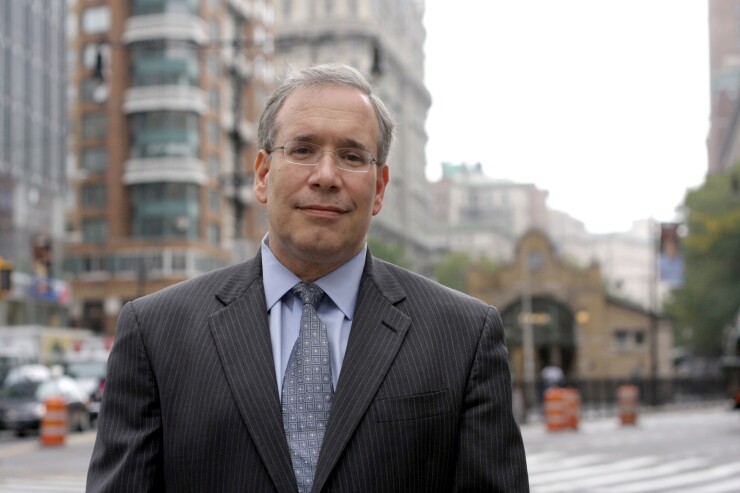New York City Comptroller Scott Stringer is touting a proposal to overhaul affordable housing amid a furor over pricing and gentrification.
Assailing the policies of Mayor Bill de Blasio, Stringer on Wednesday unveiled a "universal" plan that would require 25% permanently low-income affordable housing in all new developments with 10 or more units.
He also called for an end to the state's 421-a tax subsidy program for developers, which he said costs the city $1.6 billion annually, falls way short of meeting intended needs and spawns speculation in cherry-picked communities.
"This is not an affordable housing plan. It is a gentrification industrial complex," he told 150 persons at the YM & YWHA of Washington Heights and Inwood in northern Manhattan. Stringer, comptroller since 2014 and a presumptive mayoral candidate in 2021, grew up in Washington Heights.
Stringer also proposed the creation of a nonprofit land bank that could turn city-owned and blighted vacant lots into sites that he said could generate tens of thousands of permanently affordable housing units for the lowest-income New Yorkers.

According to a
Affordable housing is trending as a U.S. public finance dynamic as neighborhoods cope with gentrification and homelessness amid economic growth. Brooklyn Borough President Eric Adams triggered national headlines by angrily saying at a Martin Luther King Jr. Day speech: "Go back to Iowa. You go back to Ohio,"
Community groups successfully challenged a 59-block rezoning of Inwood, which hugs the northern tip of Manhattan. Last month, New York State Supreme Court Justice Verna Saunders in Manhattan nullified the plan, saying de Blasio's administration poorly vetted it, notably for its socioeconomic effects. The mayor has said he would appeal.
"There's a lot of growth and the job market is good, [but] there isn't a lot available housing supply," said Michael Marz, vice chairman of Hilltop Securities Inc. "In major metro areas, that's hard to find affordable housing for rent or ownership."
Stringer opposed the Inwood rezoning.
"The fact that a judge threw it out says that we should have a reset button," Stringer told reporters Wednesday. "This rezoning was ill. It was not well thought out. [This] will give a new administration and a new City Council the opportunity to save the neighborhood."
Term limits bar de Blasio from running for a third consecutive term.
"We understand the comptroller is looking for his next job, but actions speak louder than words: Opposing affordable homes for seniors in downtown Manhattan and releasing reports where the math doesn’t add up make it clear his vision is nothing more than talking points," said de Blasio press secretary Freddi Goldstein. "What we’ve done — giving lawyers to tenants facing eviction, rent freezes and locking in affordable rents for thousands of New Yorkers — doesn’t fuel gentrification. It prevents it.”
City Hall officials question whether the "universal" concept could ensnare the city into years of litigation with no affordable housing as result, given that it's outside the city's legal authorization to establish. They also cited other options available, such as tapping into the pension funds.
Stringer said universal housing worked in Portland, Oregon. and San Jose, California, and has withstood legal tests. The U.S. Supreme Court in 2016 would not hear a challenge in the San Jose case.
Eliminating the as-of-right 421-a tax break would require state legislative approval. Known as Affordable Housing New York, it is the largest current subsidy to generate those units.
"That needs Albany, but I think there's going to be tremendous attention to this issue," Stringer said. "We want to direct our precious resources to enhance affordability in this city. It's just a tax from a bygone era.
"There is not a person in this town who understands housing policy that thinks this is a fair and just program," Stringer added. "Why don't we invest the money in a different way?"
The New York City Independent Budget Office estimated that from 2005 to 2015, the city wasted between $2.5 billion and $2.8 billion in revenue through the 421-a program by providing more benefits than needed.

Stringer instead would provide discretionary subsidies strictly to plug financing gaps where "demonstrated, documented need" exists to meet the new affordability mandate, deepen affordability levels increase the amount of affordability or provide good-paying jobs.
His plan would also allow the city more discretion to tailor subsidies, including property tax abatements and capital subsidies. It would also mandate that all affordable housing supported through subsidies be permanently affordable, with transparent reporting of all such units created through the program.
Housing affordability is pivotal to attracting and retaining people in the city, Stringer said.
"Just to be a little comptrollerish for a minute, we're looking also at [U.S.] Census data now saying that the cities that are in the most peril are the ones that are not able to attract immigrants and new people to our city. Rather than lose population we need to gain population."
Separately, New York City Council Speaker Corey Johnson intends to release his long-term plan to tackle homelessness on Thursday.





